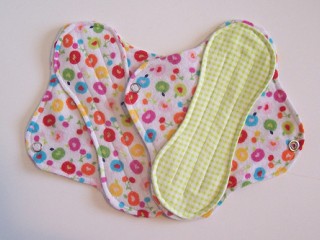Project Results:
L16025
Menstrual Hygiene Management (MHM) Project
Affordable and re-usable sanitary ware
About the project
The project aimed to develop a low cost and accessible sanitary ware for school going girls and young women, thus minimizing the number of days girls and women miss going to school or work. It also wanted to create socio-economic acceptance of the reusable sanitary pads. Furthermore, it sought to develop sanitary pads for commercial production.
Key results
-
Capacity building on reusable sanitary pads product design and development.
-
Financial support for the production of reusable sanitary pads.
-
County level product promotion, outreach and sample testing.
-
Set-up the basic production unit for re-usable sanitary pads.
-
Development of a communication strategy to ensure sustainability of the project after VIA Water support.
Tips for the future
-
Giving local partners an initial training helps them to define their value proposition; also some training to highlight the innovation in their product.
-
Pay attention on the selection of pilot sites to make sure there are no other - governmental -activities that could interfere with launching and promoting the product (like providing free sanitary pads).
Potential for growth
Promising results are that, besides the commitments and MOUs from partners, the project implementing partner has intensified the production levels. This has increased their sales of reusable sanitary pads which in turn is able to sustain production costs. With the income from the sales, they had plans to establish their enterprise in four other Counties, to cover a total of 8 Counties in 2018.
Project partners
Women Development Centre (WODEC), Jumuiya Women Group
Period
August 2016 – July 2018
Location
Eldoret, KenyaIten , Kenya
Last project updates
Background
Several studies continues to indicate that lack of access to accessible and affordable sanitary ware has far reaching implications on the social and physical health of girls in Kenya. In fact, lack of sanitary pads has been proven to be a major determinant in achieving gender parity in Kenya (APHRC 2010 and Chebii 2012). Indeed lack of appropriate and affordable sanitary pads is a critical issue of sanitation, hygiene, mobility and dignity for all girls in Kenya and world generally.
Accordingly, many girls miss on average four days of school every month which is over a month in a year, meaning they fall behind in class and sometimes even drop out of school altogether. Obonyo (2003) noted the intricate relationship between urbanization and the development in Africa, which happens without major consideration to the needs of girls and women.
In Kenya, provision of sanitary wares and information on reproductive health have majorly concentrated to the major cities and less on the other affluent and emerging towns such as Eldoret, Kabarnet, Iten and Kapsabeth. In 2014, Citizen T.V aired a feature named “Periods of shame” exposing the hardships young girls go through during their monthly menses in Baringo county in Kenya.
This report and other studies indicated a dire situation for the girls living in western Kenya. Evidently, today in Kenya menstruation is not only a health and education concern, but also sanitation policy concern. Shockingly, most girls who do not miss going to school over this recurring biological period usually use grass, cotton wool, cloth, tissue paper and even pages from their exercise books, sponge from old mattresses, chicken feathers, goat skin or soil as most available sanitary pads are out of their reach to them and their families.. To add salt to injury, menstruation is treated with silence and as a taboo topic, which limits women’s and adolescent girls’ access to relevant and important information about their bodies. This leaves the young girls in a sticky situation where they cannot ask for assistance from even their teachers of friends.
Thus there is a need for Menstrual Hygiene Management (MHM) intervention in urban areas and slums. Why? Because MHM is as an issue that has been identified by disadvantaged women and girls as a driver of gender inequality and dis-empowerment in slum areas. We plan to develop a replicate and evidence-based model for delivering re-usable sanitary pads and education to marginalized girls in already identified centers in western Kenya.
Project Plan
The project period shall extend for two years, starting August 1, 2016 and ending in July 31, 2018.
1. The first six months will focus on research and piloting of prototype
2. The next 12 months will concentrated on production and training of entrepreneurs
3. The final 6 months of the project will focus on marketing and scaling-up the project
WODEC and her implementation partners shall also adopt a two dimensional approach to attain its goal of sustainable access to sanitation services:
(i) product Approach
This approach will basically entail production procedures i.e. the sourcing of the needed machinery and materials for the production of the needed product fot the market and this will basically be guided by the logistical procedures to purchase, install, carryout organizational capacity development on the production machines. (This will be carried out between the procuring enntity (WODEC) and the selling entity from India. The capacity development will be on the machine operations, product production, handling and packaging and distribution in the wider market.
ii. Marketing approach
Our marketing strategies will entail a 2- quare approach/activities;
a. Consumer product sample piloting
This strategy will involve selection of sampled consumer segments (schoools(teanage girls) and communities (Young women) who will be availed free samples of the sanitary ware to test on its quality and the extend of re-usability. The sampling of the consumer product is aimed at improving on the quality of the products as well as assessing the beneficiaries knowledge on the product and to grasp the challenges of using the already high cost, non-biodegradable sanitray parts and the side effetcs that faces the consumers. By knowledge of such gaps in the market, WODEC can use such information in improving on her products.
b. Consumer price ceiling mapping
The consumer price ceiling mapping as a strategy is aimed at asssesing the willingness of the targeted consumers to pay for the final product and to determine the price ceilings for the final product. This strategy is very important in informing the level of subsidies that would be offered by WODEC and her distributors for the final product.
Pilot: it is aimed to pilot the production of low-cost sanitary pads by purchasing a low cost sanitary napkin manufacturing machine. The pads will be distributed on trial basis among women who are used to other expensive napkins available on the market. Through this project WODEC plans to adapt the new product to the needs of local people by engaging in product innovation and streamlining manufacturing during the pilot state. After the pilot stage, we plan to formulate a product strategy framework, which, we believe, will place WODEC in a dominant position in the Kenyan market, while working with girls and women using organized groups in our society, that include schools, women groups, local and international NGOs as well as local governments
Target group
The project will directly benefit 10,000 teenage girls in school and young women and in two years indirectly impact 100,000. They will also be educated on safe hygiene practices, create awareness of menstruation and reproductive systems, and help to address the problem of missed school days due to periods. The project will target primary school going girls from disadvantaged social and economic backgrounds in their puberty mainly in slum areas.
Sustainability
Financial sustainability
The financial sustainability of this project shall be realized after the pilot phase i.e. when the exact volume of sales has been established but as a projection, we belief we will be able to sell over 500 kits per day which will generate enough income to sustain the plant operations and to retain some daily income for WODEC. The volume of sales may-be delayed because of the re-usability of the products where clients will have to take more time in using the product before they opt for a new one. In such case WODEC shall utilize its reserves to keep the operations of the plant.
Institutional sustainability
As earlier mentioned within this proposal, WODEC staff will be trained on the operations of the machinery and product handling purposely to keep her operational costs at minimum. This will ensure that the organization has the technical staff to manage the operations of the business case, WODEC and her partners will also put to maximum utilization the warranties that will be offered by the seller of the needed machinery to make sure that we have obtained maximum capacity to handle and progress the operations. Currently we have high skilled and experience personnel to manage the project implementation stuff and we would only need capacity on the machines and the business part of the project.
Environmental
Owing to the kind of products that we will be producing (biodegradable) and re-usable, the extent to which pollutions accruing from poor disposal is at minimum and if it occurs such material shall decompose naturally. As for the machines WODEC shall give instructional details on the kind of machine to procure to ensure that it is environmentally compliant to avoid huge emissions into the atmosphere.
Technical Sustainability
WODEC and her project partners shall select a number of staff to be trained of the maintenance, repair and handling of the new machinery and in such a case staff capacity development shall be a continuous exercise and WODEC shall mobilize resource in invest in this to make the operations of the plant are not affected by staff exits. By having more of our staff getting enough technical ability to operate the plant we are sure our technical sustainability will be taken care of.
Social Sustainability
With the high volume sanitary ware producing machines and enough technical skills to avoid any breakdowns, WODEC is sure that we will be able to make our girls and young women happy by making the need available in times of need. Thus, our target populations are assured of their social sustainability.
Overview of Goals
The overall goal of this project is to develop a low cost and accessible sanitary ware for school going girls and women hence;
The specific project objectives include;
1. To minimize the number of days girls missed going to school
2. To create socioeconomic acceptance of the innovated product
3. To develop sanitary pads for commercial production and marketing,
4. To document all steps in the development process as learning and monitoring tool.
Results and indicators
- Improved school attendance in schools among primary girls
- An income generating activity for women
- Related project case studied
- This indicator will lead to the identification of the needed machinery, kind of materials to be used type of production personnel to be involved and the kind of training needed for the project to kick start that project
- Project piloted, beneficiaries mapped and product tested
- After the procurement of the needed The first products shall be targeted at specific pre-identified sampled areas/schools and the sale point and costs shall be determined after the first few sales. The indicator shall measure the viability of the project
- Business model bankrolled to include more targets and beneficiaries
- Where everything has been set, tested and proofed workable, this indicator shall inform areas of quality and packaging improvements on the final product and sustainability model for the social enterprise.
- b) Improved personal hygiene and sanitation in poor slums and neighborhoods



